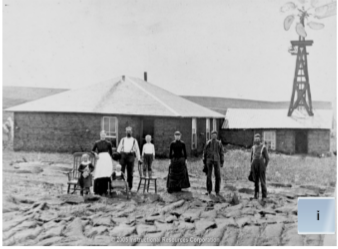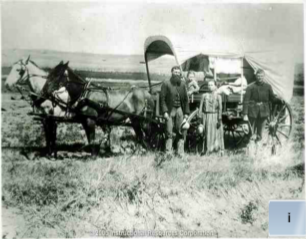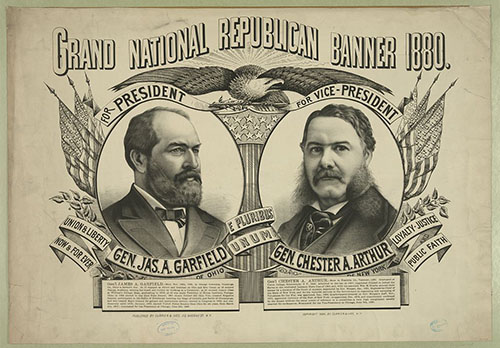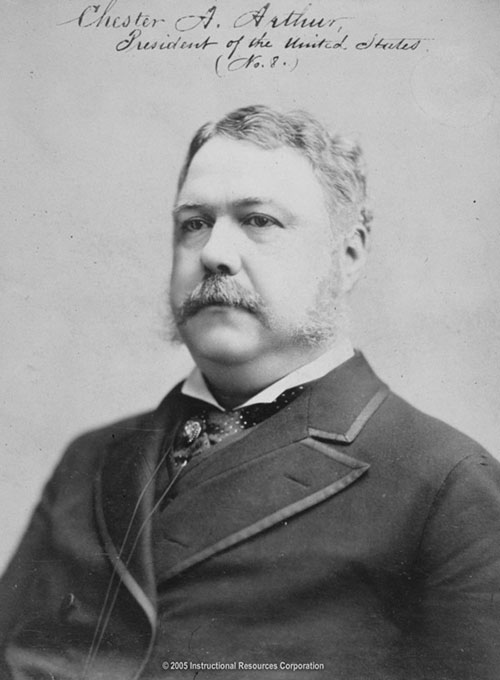Learn
The Gilded Age
A Gilded Age
In 1873, Mark Twain and Charles Warner co-authored a book in which they referred to the period after the Civil War as a "gilded age". Used in jest, the term refers to the thin layer of gold (or wealth) that disguised the rampant corruption and problems of the time period. On the surface, life appeared pleasant and promising. New factories were constructed, cities exploded in growth, and the west boomed with hopeful homesteaders. However, a look beneath the surface exposed great greed, political corruption, and pain; a life not truly golden for many Americans.
Farmers Organized
Western Expansion
In the years following the Civil War, the population of the west swelled in number. American settlers and immigrants flocked to the area to settle a space that many deemed a great wasteland.

Life on the Plains
The farming conditions were less than ideal and the weather was harsh. The vast majority of settlers gave up after a few years and returned home, with fewer than 50% deciding to stay. Over time, the advent of new technology made farming easier and the transportation of goods more profitable.

Life on the Farm
In the period following the Civil War, the population on the frontier increased dramatically. American settlers flocked Westward in hopes of opportunity and financial gain. They established homesteads, built houses, and many became farmers. Life was difficult, though. The weather was extreme and the soil conditions made planting difficult. Only the hardy survived. Read Life on the Farm to learn more about the plight of the settlers .
Farmer's Letter
Read a letter written from a farmer to the governor of Minnesota in 1875:
"I am oblige to call on you for help for i am in Such a position that i can not help myself i hav a Famfly of a Wif ant 7 Children ant i dont now where i will get anymore Provisions for them ontill the New crop omes in everthing wat i hav is a Mortgage on et ant i can not get trust for anything like Flouer or other provisions of any Kint my Flouer is all gone ant i dont now wat to do my familie is in Such a position that i am oblige to coll on your honer for help Now ef you want Sent me Something pleas sent et to Beaver Falls or Will mar."
Farmers in the Mid-West
As you can tell, the farmer from the previous slide and his family were facing a desperate situation and were in dire need of assistance. This episode was not an isolated case; countless farming families shared his family's woes. As the farmers attempted to cope with the many obstacles they faced, farmers' alliances like the Grange formed to support farmers in efforts to improve their lives. Some of these organizations ultimately became involved in politics at the national level, forming their own political party, the Populist Party, in an endeavor to represent farmers and their respective interests through economic reforms.
Creation of the Populist Party
As the farmers attempted to cope with the many obstacles they faced, organizations began to form to help support them in their efforts. Some of these organizations ultimately became involved in politics at the national level and endeavored to represent farmers and their respective interests.
Read the information from US History to learn more about the plight facing farmers and their attempt to rectify the situation:
Populism and Elections
The organizations led by angry farmers resulted in gained momentum for the Populist Party in the Elections of 1892 and 1896. Their platform called for economic reforms to help farmers and laborers with a primary focus on currency issues.
The Populist Party called for an increase in the money supply by changing to a system based on bimetallism, backing dollars with both silver and gold, rather than gold only, as was used in the gold standard system.
The Populist Movement
After years of suffering with very little support or concern in Washington, farmers organized a series of political parties; first the Grange Party, followed by the Farmers' Alliance, and finally the Populist Party (People's Party).
The Populist Movement that ensued became a powerful force politically with Populist candidates winning seats at the state, local, and national levels.
Together they were able to generate support for regulations and policies that helped the beleaguered farmer.
The Impact of Populism
To see the election results for the 1896 and 1900 elections, visit Capital and Labor and click on Interactive Map: Elections of 1896 and 1900. Notice the way the Populist Party voted during the elections.
After achieving big gains in the 1890s, the Populist Movement faded from American politics. The movement, however, left a definitive mark on the American political system by altering political alliances of the Republican and Democratic parties.
Politics
Gilded Age Politics
During the Gilded Age, the size and scope of government increased as new regulations and oversight were enacted. The larger role of government also elevated the prominence of political parties as they began playing a more influential role in the policy making process. Debates over the spoils system, tariffs, and trusts divided the parties and the nation. The American people suffered from rampant political corruption, desperate poverty, and shady business practices. Despite the corruption, Americans became more engaged, voting in record numbers.
Laissez-Faire Economy
The period became one of great wealth and growth. Leading the way were political leaders who practiced a laissez-faire or a hands-off approach to the economy. This led some to call the Gilded Age presidents "the forgettable presidents" for their lack of action. In spite of this, they managed to enact important reform measures while also steering the United States into a modern era.
Scandal and Corruption
The Political scene of the late 1800s was marred by scandal, corruption, and political patronage. This patronage, or the granting of government jobs to friends and supporters and the awarding of bribes for votes, tainted all levels of government. It wasn't until the tragic assassination of President James Garfield by a disgruntled former campaign worker that a sincere effort was made to clean up the system.

President Arthur and the Pendleton Act
Chester Alan Arthur became President when Garfield died. It was during his presidency that an attempt was made to reform the spoils system or political patronage. In 1883, the passage of the Pendleton Act instituted a merit-based system for employees in the federal government. Despite its success, the Pendleton Act did not affect conditions at the state and local levels. Political machines remained free to buy votes and control local and state politics for years to come. Read Civil Service Reform to learn more about the Pendleton Act.

Election of 1884
The Election of 1884 was a memorable one due to its mud- slinging and scandals. Grover Cleveland, Democratic governor of New York, won a close election against Republican James Blaine, despite a scandal over his acceptance of an illegitimate child years earlier.
Read The Election of 1884 to learn more about this memorable election.
Grover Cleveland
Although Grover Cleveland won the popular vote during his re-election bid in 1888, he was defeated by Benjamin Harrison in the Electoral vote. The defeat in 1888, was not the end of Cleveland's career in presidential politics. He ran again in 1892, becoming the only President in United States history to serve two non-consecutive terms. Cleveland was also the first President to be married in the White House and the first to have children while in office. Read Grover Cleveland to learn more about his unique presidency.
Further Reading
Read Gilded Age Scandal and Corruptionto learn more about the politics during the Gilded Age